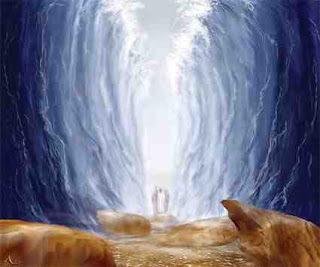Fr. Edward Powell asked Teresa to describe purgatory and judgement in December 1880, and she did so in a series of letters. This is the first.
Bootle, December 14th 1880
In the Holy Names of Jesus and Mary I will endeavour to explain what you desire to know concerning those things that our dear Blessed Lord has made me understand are really done in the soul generally after its separation from the body, though sometimes the purgatory of which I am going to speak is permitted to exist here, but I will first say what I have seen and know relating to a soul departed this life.
I have clearly understood for some time that all things are in God: I mean that there is so such thing as going to be judged, that we really are in God, as the fish in the water, surrounded by him, actually in Him. Now when the soul leaves the body, I mean in the very instant of its separation there she sees in Him (as we might behold ourselves in a mirror) at a glance the whole - every action of her life, the good she might have done, all good and evil works that have been done, all the love of the Blessed Trinity towards her. There I understand Jesus Christ allows her to know God as He is and see herself as God sees her; there is no accusation brought against her by anyone; she sees all her misery and sin at a glance, and after this look she forgets herself for ever.

She is ravished with an unspeakable love and burning desire to enjoy Him who is the essence of beauty and infinite perfection. She sees His infinite wisdom, mercy and love, and feeling His awful purity she buries herself in his justice, that in the scorching fire which love has enkindled she may consume the veil which as a mist encompasses her. This is not the guilt of sin, for that is forgiven at death by the last act of the will: I mean, there is not sin but only the effect of sin in the soul, the weaknesses caused by the inperfections and venial sins and that shade (or scars as it were) which are left after mortal sins forgiven and which prevent the soul from receiving the fullness of light which God pours into it. These shadows, whether they rise from commissions or omissions, are equally opposed to God's justice and dreadful purity.
Of course God could take away this mist or rub out the scars in an instant if He so pleased, but it is in the order of His infinite wisdom that as they were contracted by degrees so they should be remitted by little and little. The soul which is separated from the body has no further power of free will. She loves whatever God appoints and ordains for her, and loves this consuming flame, for she knows it is the fire which purifies her and enables to see and enjoy Him more and more.
I will write tomorrow, please God, what the soul suffers, and the joy which she experiences as the rays of God's light shine in more and more as the mist evaporates (as it were). I do not mean to say I will be able to express the excess and anguish of extreme pain which punishes her: no, for words are, as have said before, as so many ciphers; but with His help and in honour of the Seat of Divine Wisdom I will say something of what goes on in the souls in purgatory.
O infinite Beauty, Youth and Love, most amiable and merciful Lord, quench the flames that surround me with your Most Precious Blood. Break, O my Spouse and my Treasure, this thread of mortal life that separates me from Thee. O my Love, my Love, my Lord and my God, my Jesus, my God and my All. O Jesus, Jesus, my dear Jesus. Holy, pure and everlasting Lord. O Mary help.
I will not read what I have written, but will try to continue in the morning. Begging you prayers and your blessing, etc.






